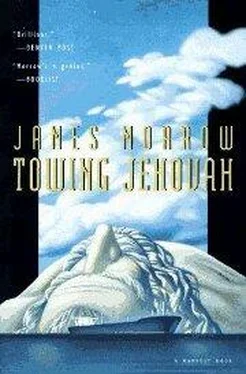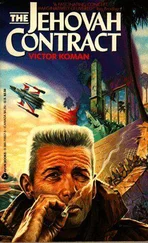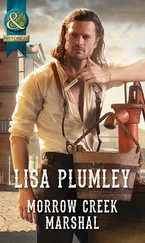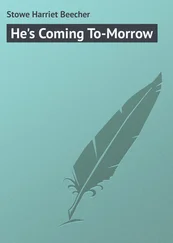“You think I’m an impostor?” asked Raphael.
“Well…”
“Be honest.”
“Of course I think you’re an impostor.”
“Watch.”
The angel plucked a feather from his left wing and tossed it into the pool. To Anthony’s astonishment, a familiar human face appeared beneath the waters, rendered in the sort of ersatz depth he associated with 3-D comic books.
“Your father is a great sailor,” said the angel. “Were he not in retirement, we might have chosen him over you.”
Anthony shuddered. Yes, it was truly he, Christopher Van Horne, the handsome, dashing master of the Amoco Caracas, the Exxon Fairbanks, and a dozen other classic ships — the soaring brow, lofty cheekbones, frothy mane of pearl gray hair. JOHN VAN HORNE, his birth certificate read, though on turning twenty-one he’d changed his name in homage to his spiritual mentor, Christopher Columbus.
“He’s a great sailor,” Anthony agreed. He chucked a pebble into the pool, transforming his father’s face into a series of concentric circles. Was this a dream? A migraine aura? “Chosen him for what?”
“For the most important voyage in human history.”
As the waters grew calm, a second face appeared: lean, tense, and hawklike, perched atop the stiff white collar of a Roman Catholic priest.
“Father Thomas Ockham,” the angel explained. “He works over in the Bronx, Fordham University, teaching particle physics and avant-garde cosmology.”
“What does he have to do with me?”
“Our mutual Creator has passed away,” said Raphael with a sigh compounded of pain, exhaustion, and grief.
“What?”
“God died.”
Anthony took an involuntary step backward. “That’s crazy.”
“Died and fell into the sea.” Raphael clamped his cold fingers around the tattooed mermaid on Anthony’s naked forearm and abruptly drew him closer. “Listen carefully, Captain Van Horne. You’re going to get your ship back.”
There was a ship, a supertanker four football fields long, pride of the fleet owned and operated by Caribbean Petroleum Company, Anthony Van Horne in command. It should have been a routine trip for the Carpco Valparaíso, a midnight milk run from Port Lavaca, spigot of the Trans-Texas Pipeline, across the Gulf and northward to the oil-thirsty cities of the coast. The tide was ripe, the sky was clear, and the harbor pilot, Rodrigo Lopez, had just guided them through the Nueces Narrows without a scratch.
“You won’t hit any icebergs tonight,” Lopez had joked, “but look out for the drug runners — they navigate worse than Greeks.” The pilot jabbed his index finger toward a vague smear on the twelve-mile radar scope. “That might be one now.”
As Lopez climbed into his launch and set out for Port Lavaca, a migraine flared in Anthony’s skull. He’d experienced worse — attacks that had dropped him to his knees and shattered the world into naming fragments of stained glass — but this was still a killer.
“You don’t look well, sir.” Buzzy Longchamps, the chronically jolly chief mate, strode onto the bridge to begin his watch. “Seasick?” he asked with a snorty laugh.
“Let’s just get out of here.” Anthony clamped his temples between his thumb and middle finger. “All ahead full. Eighty rpm’s.”
“All ahead full,” echoed Longchamps. He moved the twin joysticks forward. “Speedy delivery,” he said, lighting a Lucky Strike.
“Speedy delivery,” Anthony agreed. “Ten degrees left rudder.”
“Ten degrees left,” echoed the able-bodied seaman at the wheel.
“Steady,” said Anthony.
“Steady,” said the AB.
Ambling up to the twelve-mile radar, the chief mate touched the amorphous target. “What’s that?”
“Wooden hull, I suspect, probably out of Barranquilla,” said Anthony. “I don’t think she’s carrying coffee beans.”
Longchamps laughed, the Lucky Strike bobbing between his lips. “Stu and I can manage up here.” The mate tapped repeatedly on the able seaman’s shoulder, as if translating his own words into Morse code. “Right, Stu?”
“You bet,” said the AB.
Anthony’s brain was aflame. His eyes were ready to melt. In the presence of any navigational or meteorological hazard, two officers must be on the bridge at all times: so ran one of the few truly unambiguous sentences in the Carpco Manual.
“We’re only two miles from open water,” said the mate. “A twenty-degree turn, and we’re outta harm’s way.”
Longchamps snapped up the walkie-talkie and told Kate Rucker, the AB standing lookout in the bow, to keep her eyes peeled for a rogue freighter.
“You sure you can handle this?” Anthony asked the mate.
“Chocolate cake.”
And so Anthony Van Horne left the bridge — the last time he would do so as an employee of Caribbean Petroleum.
Nameless as a wild duck, the mahogany steamer came out of the night at thirty knots, loaded to her gunwales with raw cocaine. No running lights. Dark wheelhouse. By the time Able Seaman Rucker screamed her warning into the walkie-talkie, the steamer was barely a quarter mile away.
Up on the bridge, Buzzy Longchamps cried, “Hard right!” and the helmsman responded instantly, thereby setting the tanker on a direct course for Bolivar Reef.
Lying in his bunk, prostrate with pain, Anthony felt the Valparaíso tremble and lurch. Instantly he rolled to his feet, and before he was in the corridor the obscene odor of loose oil reached his nose. He rode the elevator to the weather deck, ran outside, and sprinted down the central catwalk, high above the writhing tangle of pipes and valves. Fumes swirled everywhere, sweeping past the kingposts in palpable clouds and spilling over the sides like absconding ghosts. Anthony’s eyes watered, his throat burned, his sinuses grew raw and bloody.
From out of the darkness, a sailor shouted, “Holy shit!”
Descending the amidships stairway, Anthony dashed across the weather deck and leaned over the starboard rail. A searchlight swept the scene, the whole stinking hell of it — the black water, the ruptured hull, the thick, viscous oil gushing from the breach. Eventually Anthony would learn how close they’d come to foundering that night; he would learn how Bolivar Reef had lacerated the Val like a can opener cutting the lid off a cocker spaniel’s dinner. But just then he knew only the fumes — and the stench — and the peculiar lucidity that attends a man’s awareness that he is experiencing the worst moment of his life.
To Caribbean Petroleum, it hardly mattered whether the Val was lost or saved that night. An eighty-million-dollar supertanker was chopped liver compared with the four and a half billion Carpco was ultimately obliged to pay out in damage awards, lawyers’ fees, lobbyists’ salaries, bribes to Texas shrimpers, cleanup efforts that did more harm than good, and a vigorous campaign to restore the corporation’s image. The brilliant series of televised messages that Carpco commissioned from Hollywood’s rock-video mills, each new spot trivializing the death of Matagorda Bay more shamelessly than its predecessor, went ridiculously over budget, so eager was the company to get them on the air. “Unless you look long and hard, you probably won’t notice her beauty mark is missing,” the narrator of spot number twelve intoned over a retouched photograph of Marilyn Monroe. “Similarly, if you study a map of the Texas coast…”
Anthony Van Horne gripped the rail, stared at the pooling oil, and wept. Had he known what was coming, he might simply have stayed there, transfixed by the future: the five hundred miles of blackened beaches; the sixteen hundred acres of despoiled shrimp beds; the permanent blinding of three hundred and twenty-five manatees; the oily suffocation of over four thousand sea turtles and pilot whales; the lethal marination of sixty thousand blue herons, roseate spoonbills, glossy ibises, and snowy egrets. Instead he went up to the wheelhouse, where the first words out of Buzzy Longchamp’s mouth were, “Sir, I think we’re in a peck of trouble.”
Читать дальше












